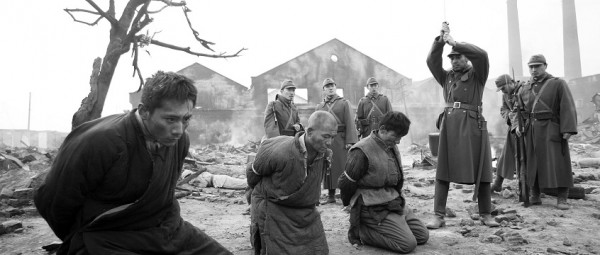
Almost exactly four years before Pearl Harbor was bombed, the Imperial Japanese Army descended upon the Chinese city of Nanjing, also known as Nanking, and one of the darkest times of humanity was unleashed. The event is often referred to as the Nanking Massacre or The Rape of Nanking. The extent of the massacre is largely debated, but it stands pretty clear that countless helpless people were terrorized, mutilated, murdered, and raped to death.
I first learned about this horrific tragedy watching the film Nanking 1937 (also known as Don’t Cry, Nanking) which lead me to read Iris Chang’s The Rape of Nanking. Director Lu Chuan’s The City of Life and Death is the newest film to bring the horrors of this abhorrent chapter of human history to life.
http://youtu.be/9td_3P3w1S4
Although The City of Life and Death follows the experience of a young and naïve Japanese soldier throughout the film, there is no lack of strong supporting characters and the texture of war is expansive, allowing the windows of history to open wide and let in the putrid stench of war. The choice to film it in black and white not only gives this new film an aged quality, it also stands in painfully stark contrast to the not-so-black-and-white realities the characters in the story face.
Even though there is substantial exploration of the perspectives of many other characters, majority of them Chinese, the choice to chain the story primarily with the perspective of a Japanese soldier is highly controversial to say the least. In this tragedy and in real history, the Japanese Imperial Army was the dominating demon. Humanizing them is as counter intuitive as being reminded that Adolf Hitler was once a helpless new born baby. I can definitely understand the strong sentiments against such character and plot choices, as I share those feelings myself, that sort of deep unfathomable and unforgiving hate that lives inside each of us. But in the end I think the choice to go with the Japanese soldier’s perspective did something important—it reminds us that those demons we hate and fear so much writhe just beneath our own skins.
We can debate the historical accuracies and inaccuracies of this film all we want, and getting the accurate story down is definitely a worthy and important goal if we are to be true to ourselves, who we are as a sentient species and where we’re going. However, I think this film does the important job of continuing to raise awareness and questions about what really happened at Nanking, to emotionally connect us to history through narrative and vicarious trauma. Watch this film knowing that you will get lost in the rubble and dust, cast among the tortured corpses, and strewn across torn souls.








